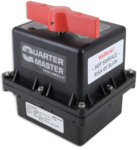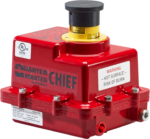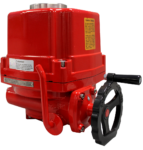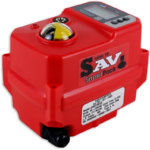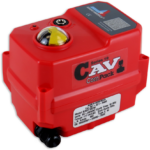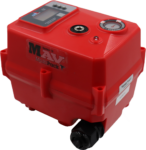Electric Actuators
An electric actuator is basically a geared motor. The motor can have various voltages and is the primary torque-generating component. To prevent heat damage from overwork or excessive current draw, electric actuator motors are usually equipped with a thermal overload sensor embedded in the motor windings. This sensor is wired in the series with the power source and opens the circuit. Should the motor be overheated, it then closes the circuit when the motor reaches a safe operating temperature.
An electric motor consists of an armature, and electrical winding, and a gear train. When power is supplied to the winding, a magnetic field is generated causing the armature to rotate. The armature will rotate as long as there is power to the windings. When the power is cut, the motor stops. Standard end of travel limit switches, which are necessary for an electric actuator, handle this task.
Electric actuators rely on a gear train coupled directly to the motor to enhance the motor torque and dictate the output speed of the actuator. The only way to change the output speed is to install a cycle length control module. This module allows an increase in cycle time only. If a decrease in cycle time is required, an alternate actuator with the desired cycle time and proper output torque must be used.
- No air supply – in many remote locations it may be impractical to run an air supply line and maintain it.
- Colder climate – compressed air systems are vulnerable to freezing and clogging of the air lines, or potentially damaging the equipment if located in a climate that frequently sees temperatures below freezing.
- PLC/DCS controlled process – In the past, standard engineering practice called for pneumatically actuated valves even when the rest of the system was electronically controlled. This required a conversion from electric to pneumatic (I/P) that made systems more complicated to startup and maintain. With the increasing popularity of PLC/DCS systems, many processes and instrumentation engineers are now specifying fully electronic actuation packages.
- Installation savings – The cost to prepare a plant for pneumatically actuating a few valves (compressor, regulators, air lines, etc) far exceeds the cost of using electrically actuated valves
*even though pneumatic actuators are used, electricity is still required to energize the solenoid valve coils that cycle the pneumatic actuators
All our electric actuator models feature 2-SPDT switches, output torque, conduit size, torque switches (if applicable), and a heater (if applicable).
Electric Actuators
Filter by Product
Looking for something?
Having trouble finding your solution? Search for specific parts, or reach out to us to help you find the valve, actuator, pipe, or anything else!

